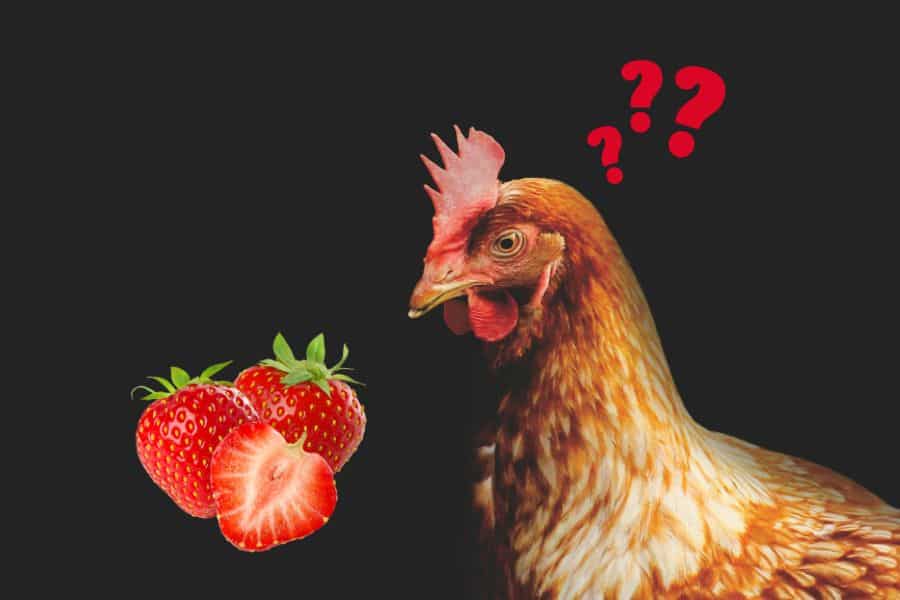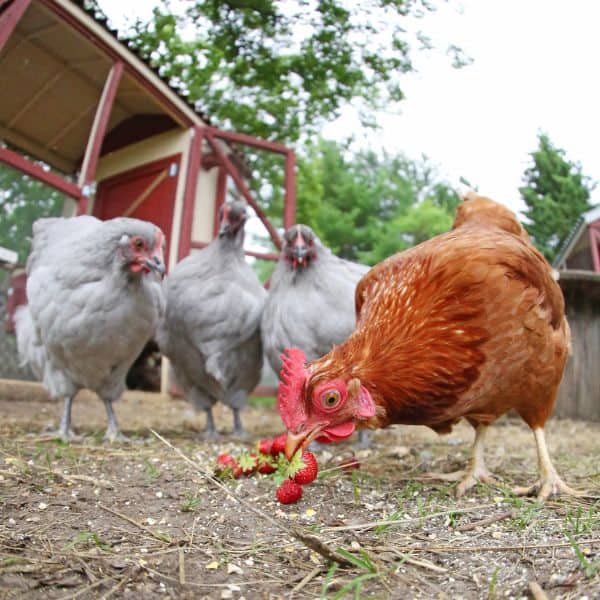Chickens are omnivores that’re known to eat a large variety of foods, ranging from small mammals and reptiles to seeds and plants.
In this article, we’ll be looking specifically at whether you can feed strawberries, including its different parts, to chickens, and why it may or may not be a good idea.
Chickens can eat strawberries, but in moderation due to the latter’s high sugar content, while the leaves, tops, and stems should be avoided.
Eating strawberries can bring along several health benefits, such as reducing the risk of heart disease and cancer, but be sure to watch out for any insecticides or mold that can make your chickens sick.
Now before we get into the good and bad of feeding your chickens strawberries, let’s see how chickens should be fed strawberries in the first place.
Can Chickens Have Strawberries?
Chickens can have strawberries; in fact, strawberries can be a good treat and supplement to their diet if fed in moderate amounts.
Do Chickens Eat Strawberries?
Chickens do eat strawberries if fed to them since they can consume a variety of foods ranging from meats and vegetables to grains and fruits.
Though not a major part of their diet, chickens nonetheless appreciate strawberries as an occasional treat.
Do Chickens Like Strawberries?
Chickens don’t mind eating strawberries as much as they don’t mind eating the other foods that make up their diet.
It’s because of this that you must control the amount of strawberries your chickens get to eat in order to avoid any potential negative health effects of which we’ll look at later.
What Part of a Strawberry Should Chickens Not Eat?
Strawberries, along with other fruit and vegetable treats, should only make up roughly 10% of a chicken’s diet, but even then, the leaves, stems, and tops of a strawberry should not be eaten even if washed.
Though the chances of chickens getting sick are small and they certainly won’t be killed by it, the poison in the leaves, stems, and tops can potentially make them ill.
As members of the rose family, strawberries contain small amounts of a toxic chemical called hydrogen cyanide. As a defense mechanism against insects, when the strawberries are picked, small amounts of hydrogen cyanide gas are released through the leaves.
Although hydrogen cyanide can be a dangerous gas (concentrations of 100-200 ppm in the air is enough to damage the heart, blood vessels, and cilia of the respiratory system), strawberries contain only about 6 ppm, which isn’t enough to be fatal.
However, if consumed during the early weeks of a strawberry’s decay process (which begins a week after its picked at the latest), the leaves, stems, and tops can make your chickens ill.
With all this being said, the poisonous parts of a strawberry are really only a risk when they’ve begun to decay, so if the leaves have already dried out, they’re perfectly safe to consume or drink (i.e. in the form of tea).
Overall though, your best bet will be to feed your chickens the actual strawberries only in order to avoid any risk of them becoming ill.
Can Baby Chicks Eat Strawberries?
Baby chicks can eat strawberries, but in a very modest manner.
Compared to adult chickens, baby chicks need a more nutritious diet in order to help them grow, hence it’s important to strictly limit the amount of strawberries (or any other type of treat) your chicks eat so that they can still focus their diets on chicken feed.
If you do decide to provide strawberries, remember to also provide them access to chick grit so that the fruit can be easily broken down and digested. Of course, you’ll want to cut up the strawberries into very small pieces so to help with the digestive process.
How Should Chickens Be Fed Strawberries?
Now that we’ve certified the fact that chickens can eat strawberries, let’s go over some tips on the best ways to feed your chickens strawberries as part of a healthy diet.
Feed Them Modestly
As already mentioned earlier, one of the most important things to remember when feeding your chickens strawberries is that you should only feed a minimal amount each time so as not to cause any health issues.
Besides the fact that too many treats can offset your chickens’ diet, the high amount of sugar in strawberries can also cause a number of health-related issues later on (more details later in the article). Though the sugar is fine for an occasional treat, you shouldn’t provide them to your chickens on a daily basis.
Pay Attention to Moldy Strawberries
Just like you, your chickens have digestive systems that are vulnerable to bacteria and subsequent infections. Therefore, you’ll want to pay attention to any bacteria, such as mold, that’s potentially growing on your strawberries.
Anytime you decide to give your chickens fruits or vegetables, make sure to give them all a close inspection to ensure no bacteria is consumed by your chickens.
Consider to Chill Your Strawberries
In order to maximize strawberries as a tasty treat, consider freezing them before you feed them to your chickens, so that it can help lower their body temperature on a hot day.
Even though chickens are warm-blooded animals like humans, they can feel the heat just as much as us. Therefore, you can try chilling the strawberries by taking them from your strawberry patch, freezing them, and then using them to cool your chickens down when the weather’s hot.
Benefits of Chickens Eat Strawberries
Although roughly 90% of a strawberry is water and the fruit contains little nutritional value (proteins, fats, etc.), they do contain various vitamins that can prove helpful in reducing the risk of heart disease and cancer.
Some common vitamins and minerals (along with their functionality) include:
- Vitamin C (an important antioxidant that reduces oxidative stress, and lowers the risk of heart disease and cancer)
- Vitamin B9 (aka folate; promotes cell growth, DNA repair, and the production of red blood cells)
- Potassium and Manganese (promotes the chicken’s metabolism)
Of these, only vitamin C is uniquely abundant in strawberries; the vitamin B9 in each 100g of strawberry accounts for only 5% of the daily required intake for a typical adult leghorn pullet, while potassium and manganese can be found in their normal diet as well.
Some other potential health benefits of consuming strawberries include:
- Stabilizing blood pressure
- Increasing good cholesterol
- Improving platelet functions
- Reducing inflammation
Remember, however, that while these health benefits might seem enticing at first, strawberries only contain small amounts of vitamins and minerals in general compared to a chicken’s typical diet and they can have downsides as well, so always feed strawberries in moderation.
Risk of Chickens Eat Strawberries
Overall, while moderately feeding your chickens strawberries is harmless and can provide minor health benefits, there are certain things you should be aware of and do your best to avoid.
Strawberries May Contain Pesticides
Out of all the foods inspected by the Environmental Working Group (an organization that focuses on helping consumers find the safest foods by making a list of fruits and vegetables with the highest and lowest pesticide contamination rates) in 2023, strawberries topped the list for foods containing the highest levels of residual pesticides.
This means that, when grown in the conventional manner, strawberries contain the highest chance of accidental pesticide contamination, which in even the smallest amounts can prove detrimental to your chickens.
Because of the risks involved, you should always wash your strawberries thoroughly in order to minimize the risks as much as possible. If you can, try to obtain organic strawberries, as they’re always the better and safer choice as recommended by the EWG.
Strawberries Contain High Sugar Contents
As previously mentioned, you’ll want to feed strawberries to your chickens in moderation due to the fruit’s high sugar content.
Strawberries are very sweet because they’re made up of almost entirely sugar and water, with glucose and fructose making up the majority of the sugar. In fact, for every 100g of strawberries, roughly 95g of them are just sugar and water.
All this sugar means that strawberries come with a very high glycemic index. And since birds are insulin-resistant (their bodies can’t remove excess sugar out of their bloodstream), they can easily cause the chickens’ blood sugar levels to spike and result in hyperglycemia.
This can result in sour crop (a fungal infection of a chicken’s crop or craw) and a variety of other health issues, such as high blood pressure, inflammation, weight gain, diabetes, and liver problems.
Because processed strawberry foods typically include high sugar content, it’s best if you can avoid any type of such foods (i.e. jams, jellies, juices, etc.) when feeding your chickens.
Strawberries Contain Trace Amounts of Hydrogen Cyanide
As stated earlier, one of the things you’ll want to do with your strawberries is remove their tops, stems, and leaves before feeding them to your chickens due to the parts possibly containing hydrogen cyanide, a poisonous gas used to deter insects.
Remember that hydrogen cyanide is only released from the fruit when it’s in its early stages of decay, so you should be especially vigilant during those times.
While the chemical probably won’t be fatal, it’s still likely to cause your chickens to become ill, so it’s imperative to remove the leaves, stems, and tops from the strawberries before feeding the fruits to your chickens.
Mold Can Harm Your Chickens’ Digestive System
As mentioned previously, mold is something that is often found on strawberries and can result in various digestive problems and infections for your chickens.
Hence, its best if you take a close inspection with each strawberry to ensure its fresh before feeding them to your chickens.
Also Read:
Can Chickens Eat Wild Strawberries?
Chickens can eat wild strawberries just like your typical store-bought ones. Although, compared to your usual strawberries, wild strawberries don’t contain as much sugar content and are smaller, you should still ensure that the fruits only make up a small portion of your chickens’ diet.
You should also make sure that wild strawberries are fresh and the leaves are young, since the decaying leaves produce the same hydrogen cyanide gas as other strawberries.
Conclusion
Strawberries can prove to be a delicious treat that your chickens will gladly indulge on, however you’ll have to make sure your chickens are only eating them modestly and that the fruit is fresh and clean before consumption.


